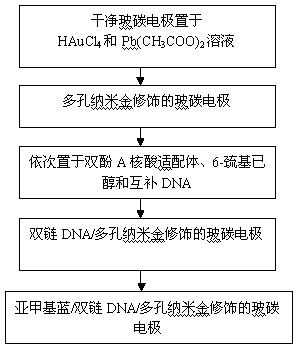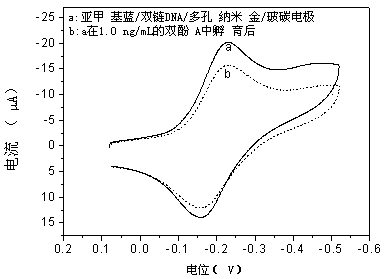A kind of non-labeled nucleic acid aptamer sensor and its detection method for bisphenol A
A nucleic acid aptamer and detection method technology, applied in the field of chemical sensing and electroanalytical chemical detection, can solve the problems of affecting the binding affinity of aptamers and target molecules, complex labeling process, and high cost
- Summary
- Abstract
- Description
- Claims
- Application Information
AI Technical Summary
Problems solved by technology
Method used
Image
Examples
Embodiment 1
[0025] Preparation of nucleic acid aptamer sensors based on porous gold nanoparticles and methylene blue electrochemical probes, such as figure 1 shown.
[0026] (1) Prepare 0.04 mol / L HAuCl 4 and 0.002 mol / L of Pb(CH 3 COO) 2 solution, the clean glassy carbon electrode was placed in the above solution, and was electro-deposited at -0.2 V for 120 s at a constant potential to prepare a porous nano-gold modified glassy carbon electrode.
[0027] (2) The porous nano-gold modified electrode was placed in 0.3 μmol / L bisphenol A aptamer for 24 h, 0.5 mmol / L 6-mercaptohexanol for 80 min, and 0.3 μmol / L complementary DNA for 80 min. min, the double-stranded DNA / porous gold nano-modified glassy carbon electrode was prepared.
[0028] (3) Soak the glassy carbon electrode modified with double-stranded DNA / porous gold nanoparticles in 0.1 mmol / L methylene blue solution for 25 min to obtain a glassy carbon electrode modified with methylene blue / double-stranded DNA / porous gold nanoparti...
Embodiment 2
[0030] Preparation of nucleic acid aptamer sensors based on porous gold nanoparticles and methylene blue electrochemical probes, such as figure 1 shown.
[0031] (1) Prepare 0.08 mol / L HAuCl 4 and 0.004 mol / L of Pb(CH 3 COO) 2 solution, a clean glassy carbon electrode was placed in the above solution, and was electro-deposited at a constant potential of -0.5 V for 70 s to prepare a porous nano-gold modified glassy carbon electrode.
[0032] (2) The porous nano-gold modified electrode was placed in 1.0 μmol / L bisphenol A aptamer for 12 h, 1.0 mmol / L 6-mercaptohexanol for 60 min, and 1.0 μmol / L complementary DNA for 60 min. min, the double-stranded DNA / porous gold nano-modified glassy carbon electrode was prepared.
[0033] (3) Soak the glassy carbon electrode modified with double-stranded DNA / porous gold nanoparticles in 0.2 mmol / L methylene blue solution for 10 min to obtain a glassy carbon electrode modified with methylene blue / double-stranded DNA / porous gold nanoparticle...
Embodiment 3
[0035] Preparation of nucleic acid aptamer sensors based on porous gold nanoparticles and methylene blue electrochemical probes, such as figure 1 shown.
[0036] (1) Prepare 0.12 mol / L HAuCl 4 and 0.006 mol / L of Pb(CH 3 COO) 2 solution, the clean glassy carbon electrode was placed in the above solution, and was electro-deposited at -0.7 V for 20 s at a constant potential to prepare a porous nano-gold modified glassy carbon electrode.
[0037] (2) The porous nano-gold modified electrode was placed in 1.5 μmol / L bisphenol A aptamer for 6 hours, 1.5 mmol / L 6-mercaptohexanol for 20 minutes, and 1.5 μmol / L complementary DNA for 20 minutes. min, the double-stranded DNA / porous gold nano-modified glassy carbon electrode was prepared.
[0038](3) Soak the glassy carbon electrode modified with double-stranded DNA / porous gold nanoparticles in 0.4 mmol / L methylene blue solution for 5 min to obtain the glassy carbon electrode modified with methylene blue / double-stranded DNA / porous gold...
PUM
 Login to View More
Login to View More Abstract
Description
Claims
Application Information
 Login to View More
Login to View More - R&D
- Intellectual Property
- Life Sciences
- Materials
- Tech Scout
- Unparalleled Data Quality
- Higher Quality Content
- 60% Fewer Hallucinations
Browse by: Latest US Patents, China's latest patents, Technical Efficacy Thesaurus, Application Domain, Technology Topic, Popular Technical Reports.
© 2025 PatSnap. All rights reserved.Legal|Privacy policy|Modern Slavery Act Transparency Statement|Sitemap|About US| Contact US: help@patsnap.com



